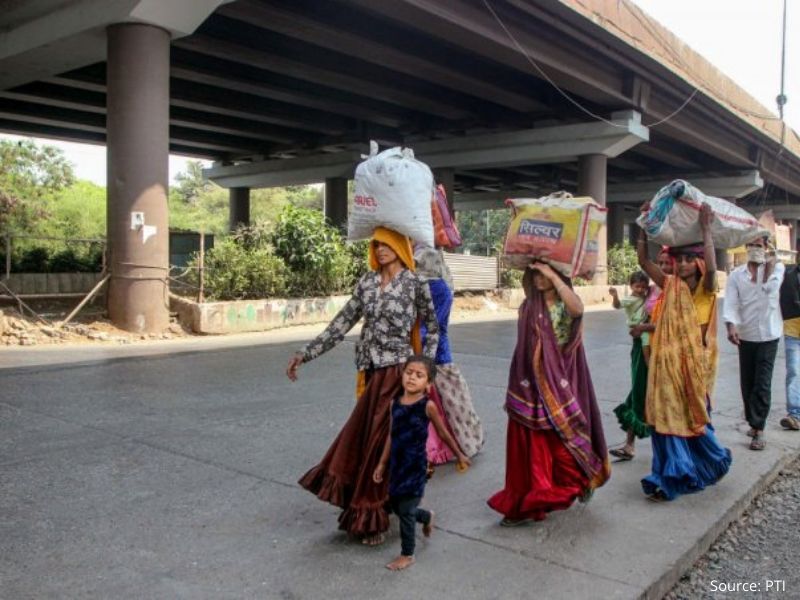A terrible injustice to which the Indian intelligentsia and great Indian middle class are helpless spectators, if not complicit, is spreading across the country in the wake of the novel corona virus, aka Covid-19 pandemic. The livelihoods of an estimated 100 million migrant labour citizens have almost vanished because the world’s harshest lockdown was imposed upon this country for six weeks to prevent the spread of the coronavirus for which an antidote has not been discovered as yet. If we assume that each migrant worker obliged to seek low-wage employment far from home — because leaders of newly independent India adopted a nihilistic economic development model and persisted with it for over four decades — has four dependents, over 400 million of India’s 1.3 billion people are in danger of death by starvation and associated maladies, including mental derangement and suicide. Despite a simultaneous lockdown on bad news, some stories of desperate anguish and despair slip through the self-imposed censorship of the middle class establishment. Recently in Badohi (UP) a young mother drowned four of her children into the Ganges because she couldn’t feed them. In Gurgaon an anguished father sold his cellphone, purchased some rations for his family and killed himself.
The Central and state governments claim that they are providing adequate accommodation and nutrition for stranded migrant labour — who it’s pertinent to record were given a mere four hours’ notice before the national lockdown was imposed on March 25 — to prevent spread of the Covid-19 contagion. Stranded at their work sites, unable to get back home to their village homes because of the suspension of all public transport, millions of them started out on foot to reach homes hundreds of miles away. Such is the faith of the country’s continuously neglected poor majority in government assurances pertaining to their welfare. To be sure the Central and state governments have taken some initiatives to provide accommodation and food to stranded migrant workers. But precious little has been done to assuage their fears about the starvation and neglect of their families in far-flung nooks and corners of the country. The Union government’s first relief package of 1.7 lakh crore and second package of 1 lakh crore for banks and finance companies aggregates a mere 1.18 percent of GDP. On the other hand the US, France, UK and several other countries have allocated near 10-15 percent of GDP to compensate their citizens for loss of employment and livelihoods.
It’s not as though India, now a middle income economy country, lacks the resources to provide meaningful relief to the poor majority devastated by the Covid-19 crisis. Your editor has been repeatedly advising the Central government to borrow a sum of Rs.8 lakh crore (3.52 percent of GDP) from the RBI and immediately deposit Rs. 4,444 per month by way of direct transfer benefits or RBI cheques into the bank accounts of the country’s 150 million poorest households, for the next 12 months. This sum can be returned By the Union government to RBI by raising an additional Rs. 8 lakh crore in the Union budget 2021-22. A resource mobilisation calculus to raise this additional Rs. 8 lakh crore has been sent to the PMO, Union finance ministry, Niti Aayog and several public intellectuals and economists and also published in EducationWorld (https://www.educationworld.in/union-budget-2020-21-small-change-for-human-capital-development/) and the social media. However it has not received any support.
Your editor’s guess is this proposal has not gained any traction is that because it envisages additional (modest) taxation of the middle class by way of slashing non-merit subsidies, reducing establishment and defence expenditure, fire sale of public sector enterprises and a mere Rs. 1,000 modest flat tax on all income tax assessees. Clearly this package is unacceptable to the upper middle class which runs the country and has cornered all the gains accruing from India’s independence from foreign rule seven decades ago. The Covid 19 crisis offers India’s cruel middle and upper classes which include the intelligentsia and academy, an opportunity to atone for mistakes of the past. They can – and should — be willing to bear some pain for the greater good of the least of these our brethren.
Dilip Thakore is the founder editor/publisher of EducationWorld – The Human Development Magazine (1999). A barrister-at-law of the Hon’ble Society of Lincoln’s Inn, turned writer and publisher, Thakore was the founder editor of Business India and Business World.
